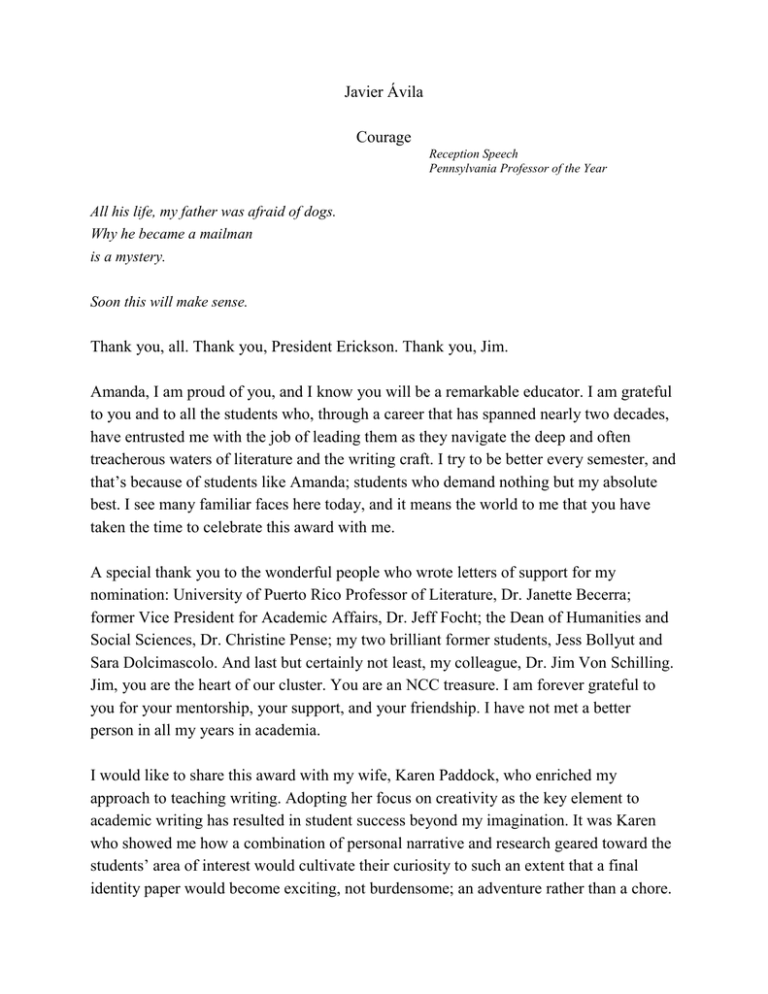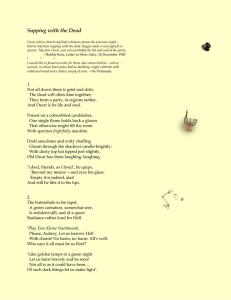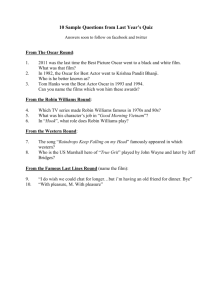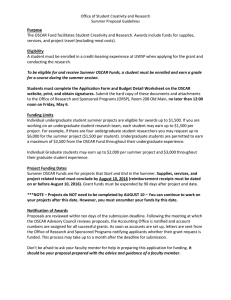Javier Ávila Courage
advertisement

Javier Ávila Courage Reception Speech Pennsylvania Professor of the Year All his life, my father was afraid of dogs. Why he became a mailman is a mystery. Soon this will make sense. Thank you, all. Thank you, President Erickson. Thank you, Jim. Amanda, I am proud of you, and I know you will be a remarkable educator. I am grateful to you and to all the students who, through a career that has spanned nearly two decades, have entrusted me with the job of leading them as they navigate the deep and often treacherous waters of literature and the writing craft. I try to be better every semester, and that’s because of students like Amanda; students who demand nothing but my absolute best. I see many familiar faces here today, and it means the world to me that you have taken the time to celebrate this award with me. A special thank you to the wonderful people who wrote letters of support for my nomination: University of Puerto Rico Professor of Literature, Dr. Janette Becerra; former Vice President for Academic Affairs, Dr. Jeff Focht; the Dean of Humanities and Social Sciences, Dr. Christine Pense; my two brilliant former students, Jess Bollyut and Sara Dolcimascolo. And last but certainly not least, my colleague, Dr. Jim Von Schilling. Jim, you are the heart of our cluster. You are an NCC treasure. I am forever grateful to you for your mentorship, your support, and your friendship. I have not met a better person in all my years in academia. I would like to share this award with my wife, Karen Paddock, who enriched my approach to teaching writing. Adopting her focus on creativity as the key element to academic writing has resulted in student success beyond my imagination. It was Karen who showed me how a combination of personal narrative and research geared toward the students’ area of interest would cultivate their curiosity to such an extent that a final identity paper would become exciting, not burdensome; an adventure rather than a chore. Karen illustrates what I’ve always believed: That teaching is an art form. Through the years, appreciating the mastery of her craft has ignited a flame in my own pedagogy. I strive to be the teacher that she is every day. In addition to being an inspiration, Karen has given me the greatest gift of my life, and that is Oscar. He is a creative force, and his existence has opened my eyes in a way that continues to amaze me. It has increased my empathy. As Karen said when Oscar was a baby, “each of our students is somebody’s Oscar.” My goal is to treat my students the way I would like Oscar’s teachers to treat him. I want to challenge them, allow them to explore their creativity, provide them with an environment where they feel comfortable to be themselves, treat them with respect, be authentic with them and expect them to be authentic with me, and make sure that they never forget that learning is enlightening, empowering, and beautiful. The look in my son’s eyes after he has made a discovery is the same look I want to see in my students’ eyes when they are in my classroom. My mother, who was a public school teacher for 35 years, considered herself lucky to be able to do something she loved. Like her, I am lucky. The love of teaching comes from the love of learning. The classroom is a sanctuary where this love must be nurtured and embraced, and the way I see it, true love is not a cage; it is an open field. Creativity is the key. In all my classes, creativity is not a wish; it is an expectation. When students can create the knowledge, when they can add to the existing conversation with original ideas, they become protagonists of their education rather than spectators. I make it my mission to allow for those ideas to emerge, even when they may be afraid to be wrong. Fear is fine. You see, courage does not mean the absence of fear. It means daring to do things despite fear. My father taught me this by doing something he loved while facing something he feared. Being a dog-fearing mailman was, believe me, just one example of the multiple instances where my father showed me how important it is to dare to do things, to fail, get up, and try again, realizing that failure does not define a man. Perseverance does. It is all part of the ongoing process. The creative process allows students to be courageous, and it invariably leads to something magical. That is the roller coaster of learning. With courage comes the recognition that magic is rare, that life is urgent, and that the time for excellence is now. The classroom experience, therefore, should never be passive, or lacking in conflict, or neglectful of reality. This is especially important in a community college, where largely underrepresented students come with the hopes of improving their lives. If they did not feel included in their pre-college journeys, then it is our duty as educators to have them see themselves in the curriculum. This is an equalizer: an intercultural approach that removes the notion that some of us are invisible. Working toward this goal fuels me as an educator. The most rewarding aspect of my job is each student’s sense of accomplishment. A student’s success is my success. The classroom experience can transform their lives, and in return, the learning opportunities they provide for me continue to transform mine. Of course, it is an honor to be recognized for something I love to do. Nevertheless, as a representative of NCC, this is an award for all faculty, not just for me. It means that we are doing what we’re supposed to do. I accept this honor on behalf of all of you, as well as the educators that came before us, and I urge my colleagues to continue to do the magnificent job that they do. Finally, Oscar, thank you for giving me a new set of eyes to rediscover the world in all its splendor. It is a privilege to be alive and witness the magic of your journey. I love you. Thank you.




